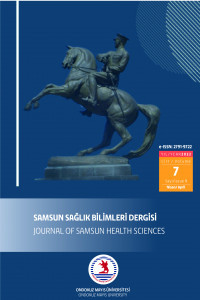Covid-19 Pandemi Sürecinde Kadınların Doğum Sonrası Kaygı Düzeylerinin İncelenmesi
COVİD-19, Doğum Sonrası Dönem, Kaygı, Kadın
Investigation of Postpartum Anxiety Levels of Women in the COVID-19 Pandemic Process
COVID-19, Postpartum Period, Anxiety, Woman,
___
- Aktaş, M.C., Şimşek, Ç., Aktaş, S. (2017). Postpartum depresyonun etiyolojisi: kültür etkisi. Hemşirelik Akademik Araştırma Dergisi, 3(Ek sayı), 10-13.
- Bohren, M.A., Hofmeyr, G.J., Sakala, C., Fukuzawa, R.K., Cuthbert, A. (2017). Continuous support for women during childbirth. Cochrane Database Systamic Reviews, 7(1), 171-173.
- Brooks, S.K., Webster, R.K., Smith, L.E., Woodland, L., Wessely, S., Greenberg, N. (2020). The psychological impact of quarantine and how to reduce it: rapid review of the evidence. Lancet, 395(10227), 912-920.
- Calpbinici, P., Uzunkaya Öztoprak, P., Akbay Kısa, A.S. (2020). Gebelik, doğum ve doğum sonu dönemde yeni koronavirus enfeksiyonunun (COVID-19) yönetimi ve hemşirenin rolü. International Journal of Social Science Research, 13(71), 1112-1121.
- Chen, Y., Peng, H., Wang, L., Zhao, Y., Zeng, L., Gao, H. (2020). Infants born to mothers with a new coronavirus. Frontiers in Pediatrics, 16(8), 104.
- Chua, M., Lee, J., Sulaiman, S., Tan, H.K. (2020). From the frontline of COVID-19–How preparedare we as obstetricians: a commentary. JOG: An International Journal of Obstetrics & Gynaecology, 127(17), 1471-1528.
- Çağlar, M., Yeşiltepe Oskay, Ü. (2020). COVID-19 Pandemisi sürecinde gebelik ve doğum yönetimi. University of Health Sciences Journal of Nursing, 2(2), 99-104.
- Çuvadar, A., Özcan, H., Arıkan, M.G., Ateş, S. (2020). COVID-19 tanılı gebede postpartum kaygı düzeyi: İki olgu sunumu. Ordu University Journal of Nursing Studies, 3(3), 297-301.
- Davis-Floyd, R., Gutschow, K., Schwartz, D.A. (2020). Pregnancy, birth and the COVID-19 pandemic in the United States. Medical Anthropology, 39(5), 413-427.
- Deepika, Kumar, P. (2020). Postpartum, mental health and COVID-19 pandemic: ıssue, challenges and management. International Journal of Science and Healthcare Research, 5(4), 112-120.
- Demir Turen, E., Kılıç, F. (2020). Determination of the anxiety level in pregnant women who administer to the obstetrics clinic within the COVID-19 pandemia period. Selcuk Medical Journal, 36(4), 352-356.
- Doğan, R.A., Hancıoğlu Aytaç, S., Taşlar, N. (2020). COVID-19 Pandemisinde; gebelik, doğum ve doğum sonu dönemde kadınların sosyal destek gereksinimi ve ebelik yaklaşımları. Turkish Studies, 2020;15(4), 679-689.
- Erdoğan, A., Hocaoğlu, Ç. (2020). Enfeksiyon hastalıklarının ve pandeminin psikiyatrik yönü: Bir gözden geçirme. Klinik Psikiyatri Dergisi, 23(1), 72-80.
- Erdoğdu, Y., Koçoğlu, F., Sevim, C. (2020). COVID-19 pandemisi sürecinde anksiyete ile umutsuzluk düzeylerinin psikososyal ve demografik değişkenlere göre incelenmesi. Klinik Psikiyatri Dergisi, 23(1), 24-37.
- Jungari, S. (2020). Maternal mental health in India during COVID-19. Public Health, 185(1), 97-98.
- Ostacoli, L., Cosma, S., Bevilacqua, F., Berchialla, P., Bovetti, M., Roberto, A. (2020). Psychosocial factors associated with postpartum psychological distress during the COVİD-19 pandemic: a cross-sectional study. BMC Pregnancy and Childbirth, 20(1),703-802.
- Öner, N., Le Compte, A. (1983). State-Trait Anxiety Inventory Manual (1st Edition). Istanbul, Boğaziçi Üniversitesi Yayınevi.
- Poon, L.C., Yang, H., Dumont, S., Lee, J.C.S., Copel, J.A., Danneels, L. (2020) ISUOG Interim Guidance on 2019 novel coronavirus infection during pregnancy and puerperium: information for healthcare professionals. Ultrasound in Obstetrics & Gynecology, 55(5), 700-708.
- Schwartz, D.A. (2020). The Effects of pregnancy on women with COVID-19: Maternal and infant outcomes. Clinical Infectious Diseases, 71(16), 2042-2044.
- Schwartz, D.A., Graham, A.L. (2020). Potential maternal and infant outcomes from coronavirus 2019- NCOV (SARS-CoV-2) infecting pregnant women: Lessons from SARS, MERS, and other human coronavirus infections. Viruses, 12(2), 194.
- Spielberger, C.D., Gorsuch, R.L., Lushene, R. (1970). Manual for the State-Trait Anxiety Inventory. Palo Alto, CA: Consulting Psychologists Press.
- Wang, C., Pan, R., Wan, X., Tan, Y., Xu, L., Ho, C. (2020).. Immediate psychological responses and associated factors during the ınitial stage of the 2019 Coronavirus Disease (COVID-19) epidemic among the general population in China. International Journal of Environmental Research and Public Health, 17(1), 1729.
- World Health Organization. Q&A on COVID-19, pregnancy, childbirth and breastfeeding. World Health Organization [Internet]. 2020 [Erişim Tarihi 16 Mayıs 2021]. Erişim adresi: https://www.who.int/news-room/q-a-detail/q-a-on-covid-19-pregnancy-childbirth-and breastfeeding.
- Yalçın, H., Kay,a Ş. (2020). COVİT-19 Pandemi sürecinde doğum yapan annelerin kaygı düzeyleri ve duygu düzenleme becerilerinin incelenmesi. International Social Science Journal, 6(65), 2778-2786.
- Yılmaz, E., Çağlayan, N., Yazıcı, S. (2020). COVİD-19 Pandemisinin gebelik, doğum ve doğum sonrası döneme etkileri ve sürecin yönetimi. Van Sağlık Bilimleri Dergisi, 13(Özel sayı), 92-99.
- Yue, L., Han, L., Li, Q., Zhong, M., Wang, J., Wan, Z. (2020). Anaesthesia and infection control in cesarean section of pregnant women with coronavirus disease 2019 (COVID-19). The Journal of Clinical Anesthesia, 66(109908), 2384.
- Zanardo, V., Manghina, V., Giliberti, L. (2020). Psychological impact of COVID19 quarantine measures in northeastern Italy on mothers in the immediate postpartum period. The International Journal of Gynecology & Obstetrics, 150(2),184-188.
- Yayın Aralığı: Yılda 3 Sayı
- Başlangıç: 2021
- Yayıncı: Ondokuz Mayıs Üniversitesi
Nuran MUMCU, Nurcan COŞKUN US, Nilay ÇÖMÜK BALCI, Deniz KAZANOĞLU, Mine PEKESEN KURTÇA, Ali Erman KENT, Canan ASAL ULUS, Sevil MASAT HARBALİ, Fatma CANIM, Zeynep BAROL
Ayten YILMAZ YAVUZ, Zeynep PEHLİVAN, Vacide AŞIK ÖZDEMİR
Mesleğin Başında Hemşirelik Öğrencilerinin Mesleki Algıları: Nitel Bir Çalışma
Gamze BOZKUL, Atiye KARAKUL, Senem ANDI, Duygu SÖNMEZ DÜZKAYA, Nadiye BARIŞ EREN, Gülşah ÇAMCI
Merve KOYUN, Esra TURAL BÜYÜK, Nihal ÜNALDI BAYDIN, Emel ODABAŞOĞLU
Ameliyat Sonrası Dönemde Hastaların Hemşirelik Bakımını Değerlendirmeleri
Fatma Nur ÇENGEL, Aysel KOKCU DOGAN
Esra GÜNEY, Zeynep BAL, Esra KARATAŞ OKYAY, Tuba UÇAR
Covid-19 Pandemi Sürecinde Kadınların Doğum Sonrası Kaygı Düzeylerinin İncelenmesi
Hizmet Sektörü Çalışanlarının Yaşadığı Sağlık Sorunları ve Sağlıklı Yaşam Biçimi Davranışları
Mehmet KORKMAZ, Özge ÖZ, Dilek ÇELİK EREN, İlknur AYDIN AVCI
